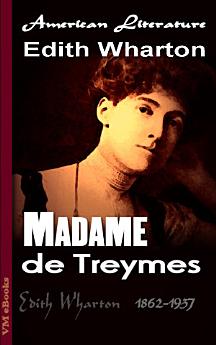Madame de Treymes: American Literature
关于此电子书
John Durham, while he waited for Madame de Malrive to draw on her gloves, stood in the hotel doorway looking out across the Rue de Rivoli at the afternoon brightness of the Tuileries gardens.
His European visits were infrequent enough to have kept unimpaired the freshness of his eye, and he was always struck anew by the vast and consummately ordered spectacle of Paris: by its look of having been boldly and deliberately planned as a background for the enjoyment of life, instead of being forced into grudging concessions to the festive instincts, or barricading itself against them in unenlightened ugliness, like his own lamentable New York.
But to-day, if the scene had never presented itself more alluringly, in that moist spring bloom between showers, when the horse-chestnuts dome themselves in unreal green against a gauzy sky, and the very dust of the pavement seems the fragrance of lilac made visible—to-day for the first time the sense of a personal stake in it all, of having to reckon individually with its effects and influences, kept Durham from an unrestrained yielding to the spell. Paris might still be—to the unimplicated it doubtless still was—the most beautiful city in the world; but whether it were the most lovable or the most detestable depended for him, in the last analysis, on the buttoning of the white glove over which Fanny de Malrive still lingered.
评分和评价
作者简介
Edith Wharton (January 24, 1862 – August 11, 1937) was a Pulitzer Prize-winning American novelist, short story writer, and designer. She was nominated for the Nobel Prize in Literature in 1927, 1928 and 1930. Wharton combined her insider's view of America's privileged classes with a brilliant, natural wit to write humorous, incisive novels and short stories of social and psychological insight. She was well acquainted with many of her era's other literary and public figures, including Theodore Roosevelt.
Despite not publishing her first novel until she was forty, Wharton became an extraordinarily productive writer. In addition to her fifteen novels, seven novellas, and eighty-five short stories, she published poetry, books on design, travel, literary and cultural criticism, and a memoir.
Wharton first began inventing stories when she was six. She would walk around the living room holding a book while reciting her story. In 1873, Wharton wrote a short story and gave it to her mother to read. Her mother criticized the story, so Wharton decided to just write poetry. While she constantly sought her mother's approval and love, it was rare that she received either. From the start, the relationship with her mother was a troubled one. Before she was fifteen, she wrote Fast and Loose (1877). In her youth, she wrote about society. Her central themes came from her experiences with her parents. She was very critical of her own work and would write public reviews criticizing it. She also wrote about her own experiences with life. “Intense Love’s Utterance” is a poem written about Henry Stevens.
In 1889, she sent out three poems for publication. They were sent to Scribner’s, Harper’s and Century. Edward L. Burlingame published “The Last Giustiniani” for Scribner’s. It was not until Wharton was 29 that her first short story was published. "Mrs. Manstey's View" had very little success, and it took her more than a year to publish another story. She completed "The Fullness of Life" following her annual European trip with Teddy. Burlingame was critical of this story but Wharton did not want to make edits to it. This story, along with many others, speaks about her marriage. She sent Bunner Sisters to Scribner’s in 1892. Burlingame wrote back that it was too long for Scribner’s to publish. This story is believed to be based on an experience she had as a child. It did not see publication until 1916 and is included in the collection called Xingu. After a visit with her friend, Paul Bourget, she wrote “The Good May Come” and “The Lamp of Psyche”. “The Lamp of Psyche” was a comical story with verbal wit and sorrow. After “Something Exquisite” was rejected by Burlingame, she lost confidence in herself. She started “travel writing” in 1894.












